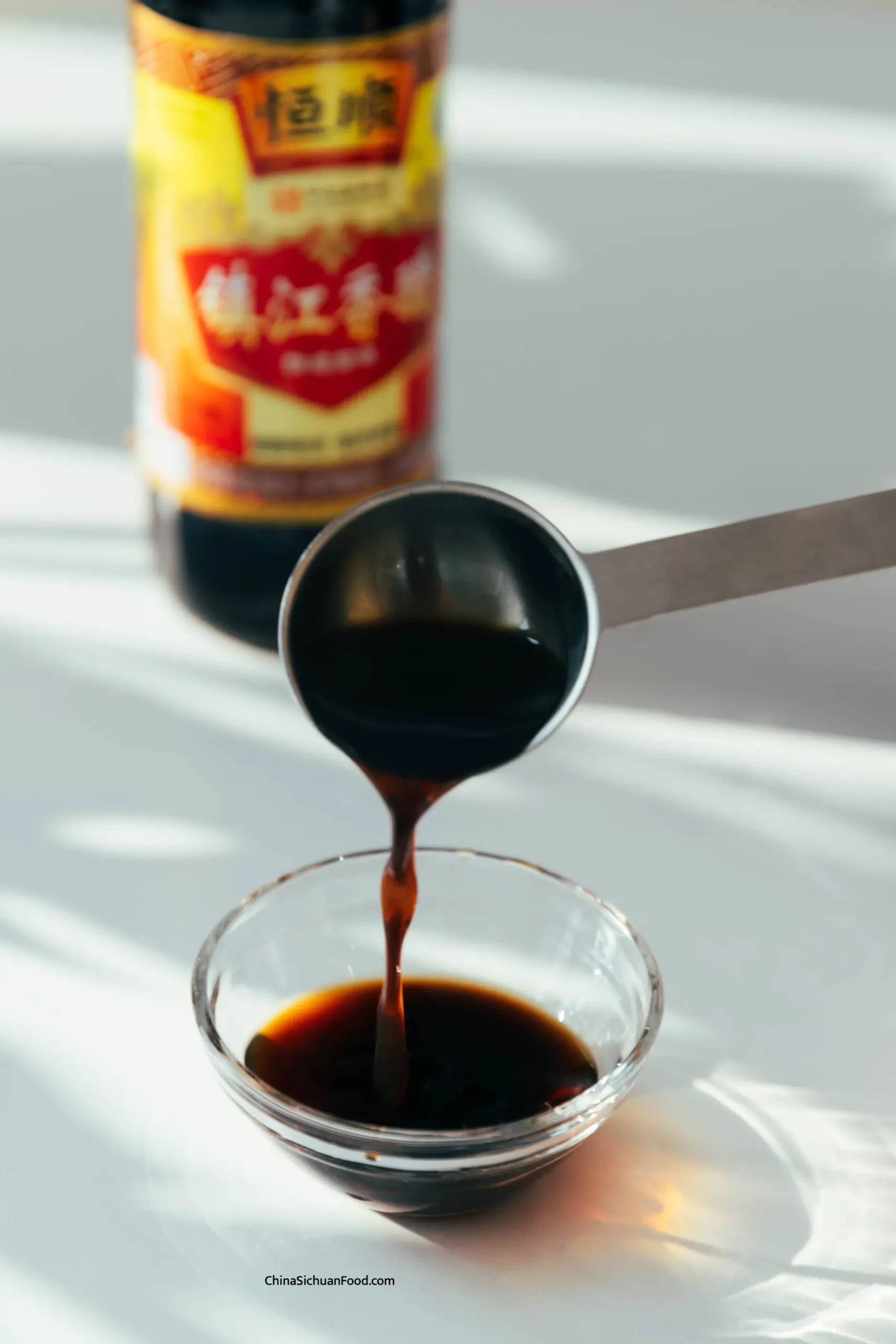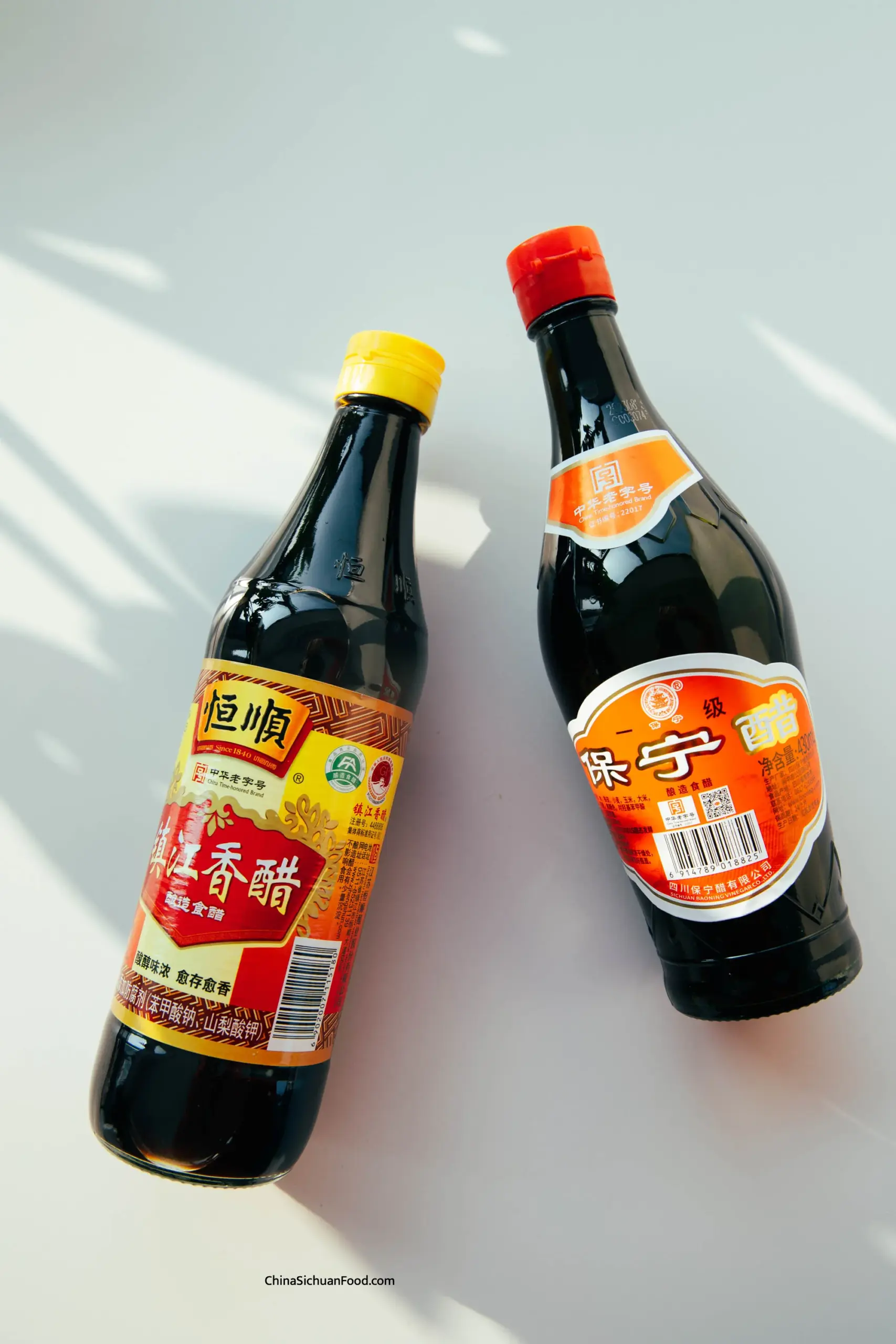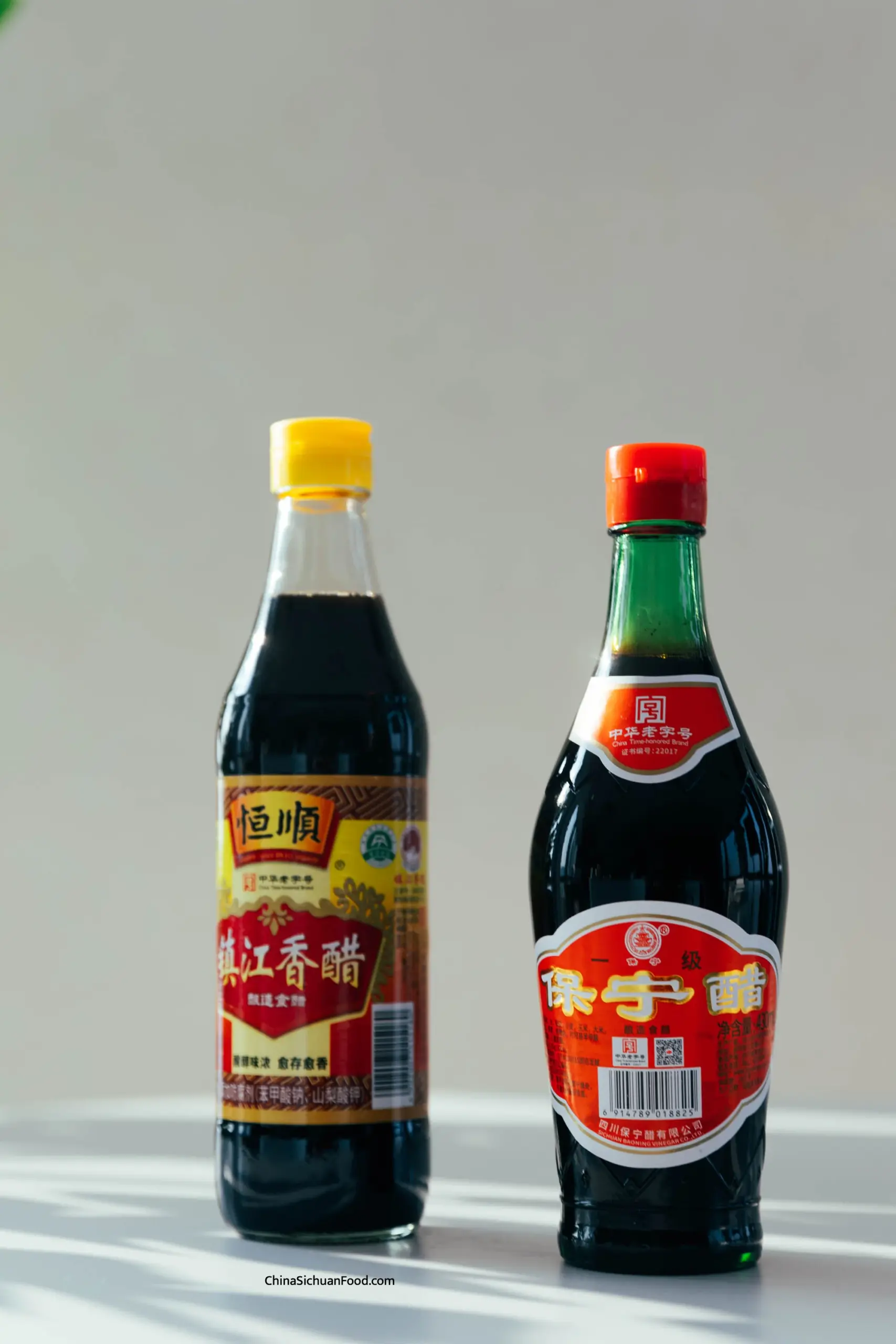Vinegar is one of those pantry essentials every kitchen needs. Its tartness works to balance flavors in various dishes. But have you ever heard of Chinese black vinegar? It’s a little different to your average white vinegar. Keep reading to find out why and how to use it in the kitchen, plus easy substitutes. It brings a complex and unique tang taste that contributes a lot to many famous Chinese dishes.

What is Chinese black vinegar?
Chinese black vinegar (香醋 or 黑醋)has been used in China since around 480 BC. Four major kinds of Chinese black vinegar are available today, but the most popular is Chinkiang (Zhenjiang) vinegar. Its two main ingredients are glutinous rice and malt.
In mainland China, some of the other brans are super popular too.
- Shanxi mature vinegar. Commonly used in northern China, Shanxi vinegar is made from sorghum, barley, and wheat bran. Because it’s aged up to five years, it has a more robust smoky flavor.
- Sichuan black vinegar. The most common by-product is Sichuan Baoning vinegar, it’s made from wheat bran and traditional medicinal herbs and spices. It’s typically aged up to a year.
- Fujian Yongchun vinegar. Made from glutinous rice, it’s infused with unique fungi to turn it red.
In Japan and Korea, their versions of black vinegar are made from brown rice and have a nuttier taste. Meanwhile,
Taiwanese black vinegar is more similar to Worcestershire sauce as the vinegar is infused with other ingredients. This gives it a fruitier flavor compared to black vinegar.

A magic but long process
There’s a two-step fermentation process to make black vinegar. It’s traditionally aged at least six months (sometimes up to five years, as mentioned) in clay pots. The umami flavor and deep color are due to the carbohydrates in the rice or grains reacting with amino acids. The longer the fermentation goes on, the better flavor will be created. So it is a gift from time.
The Unique Complex Tastes of Chinese black vinegar
Chinese black vinegar has a complex depth of flavor you won’t find in other types of vinegar. It’s less tangy than rice vinegar and less sweet than balsamic vinegar. But it also has more umami flavor than your average vinegar. Think of it as a full-bodied aromatic combination of rich texture and sweet, smoky malt flavors.
Health benefits
We believe that black vinegar has benefits for our body from the perspective of Chinese traditional medicine.
- It fights fatigue as it contains amino acids.
- It can aid weight loss by increasing that full feeling and reducing your appetite.
- It can help people with diabetes better control blood sugar spikes.
Usages How to use Chinese black vinegar in cooking
As a super common ingredient in Chinese cooking, we have lots of ways of using Chinese black vinegar.
- As a dipping sauce. In northern China, they frequently use Shanxi vinegar with a pinch of ginger as a dipping sauce for soup dumplings.
- As a marinade. Black vinegar is frequently used to marinade, baste, or braise dishes. I use it for all types of meat, including beef, pork, fish, and chicken. It’s excellent for slow-braised pork ribs, marinated pork chops, marinated and roasted vegetables, or braised fish (Hongshao Yu) and Hong Shao Pork belly.
- As a glaze. Reduce it on the stovetop with sugar and soy sauce to make a glaze for vegetables or tofu.
- In dressings. Make any salad dressing or cold appetizer better with some black vinegar. It’s popularly used in wood ear salad, but it would also work great to add a punch of flavor to a traditional chicken salad or Chinese potato salad.
- In stir-fry sauces. Add acidity to any stir fry with black vinegar. It pairs perfectly with soy sauce. It can create a lovely sweet or sour taste or spicy and sour taste in stir-fry sauces like sweet and sour sauce.
Best brands
The most popular brand is Gold Plum Chinkiang Vinegar. Fortunately, it’s super cheap, so you have no excuses not to give it a go! Depending on where you’re located, you’ll find it in most Asian supermarkets.

Best substitutes for Chinese black vinegar
Well, this is the most commonly asked question. You may find lots of recipes, especially authentic Chinese ones, call for Chinese black vinegar If it is unavailable for you, try to use the following substitutes. We also calculated a very basic ratio.
Balsamic vinegar
These vinegars are often compared with each other. But they are two separate products, although they look similar and are both aged. Black vinegar is less sweet and more savory than balsamic vinegar.
If you swap them, I recommend reducing the sweetness in the recipe elsewhere if possible, as balsamic is sweeter than black vinegar. Otherwise, this is a straight 1:1 swap.
Coconut aminos sauce
This is a naturally gluten-free and vegan sauce derived from coconut sap. It has a savory flavor similar to black vinegar, so I like to use it as a substitute. As for the ratio, use two teaspoons of coconut amino sauce for every teaspoon of black vinegar.
Rice vinegar
Chinese black vinegar is made from rice, so white rice vinegar or rice wine vinegar are great substitutes. However, black vinegar isn’t as tart as these options. So, if you swap, I recommend adding a pinch of sugar or honey to the recipe to balance the tartness and replicate black vinegar’s flavor.
Malt vinegar
Malt vinegar is commonly served with fish and chips. But because black vinegar is made from malt, it’s another good substitute. Once again, I recommend adding a pinch of sugar and honey to add some sweetness.
Worcestershire sauce
Worcestershire sauce and Chinese black vinegar look like twins. They also have a very similar flavor profile. So you can easily do a 1:1 swap with these products.
Sherry vinegar
Sherry vinegar doesn’t have the same complex savory notes as black vinegar, but it brings the same sweetness. So it’s another popular substitute. Taste-test as you go with sherry vinegar, as it’s milder than black vinegar, so you might need to add more.
Concerning the best substitute for Chinese black vinegar, work with what you’ve got on hand. Any of these options are great swaps. Feel free to combine more than one option too:
- 1 part white vinegar, 1 part rice wine vinegar, and a pinch of sugar.
- 1.5 parts rice wine vinegar or malt vinegar with half-part balsamic vinegar.
- 1 part balsamic vinegar with a pinch of Worcestershire sauce or soy sauce.
We hope this comprehensive guide to Chinese black vinegar has taught you something new and you’re ready to start cooking with it. Whether you try it as a marinade or a dumpling dipping sauce, I bet you’ll be hooked after just one bite!
